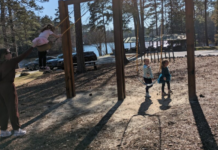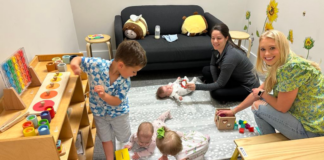 Finally, it is cold enough for a fire in the hearth, a pot of soup on the stove and long winter naps. Fall through the winter holidays is my favorite time of year for coming inside as a family, but remember, children need to play outside every day, even in winter and especially in our mild southern climate.
Finally, it is cold enough for a fire in the hearth, a pot of soup on the stove and long winter naps. Fall through the winter holidays is my favorite time of year for coming inside as a family, but remember, children need to play outside every day, even in winter and especially in our mild southern climate.
Going outside to run, jump, make noise, and move allows children to use their large muscles and work off extra energy. This is never so important as during the busy holiday season.
Moving out in the fresh air is also healthier for children than keeping them inside a closed building where germs can easily spread. Dr. Claire McCarthy of Harvard Medical School Health Blog recommends spending plenty of time playing outdoors as one of the simplest ways to improve your child’s future health and success.
Why is playing outside crucial to your child’s health and success this fall into winter?
It turns out that our bodies need some sunlight to make Vitamin D. Too much sun exposure, especially sunburns, can increase the risk of skin cancer, but Vitamin D plays a role in good health from bone development to our immune system. Sun exposure also plays a role in healthy sleep and in our mood. Our bodies work best when they get some sunshine every day.
Children need to be physically active for an hour every day. Getting outside to play is one of the best ways to make that happen. Kids can exercise indoors, and on bad weather days that should happen, but sending them outdoors with a bicycle or a ball and some friends is one of the best ways to get the exercise they need.
Creativity and learning to handle life can be stimulated outdoors through unstructured time. Children must develop life skills that teach them to plan, solve problems, negotiate and multitask that they will need throughout their lives. Creativity is at work here too.
Using imagination to problem-solve and entertain oneself are encouraged outdoors. These are skills that must be practiced — and to do this, children need unstructured time. They need time alone and with other children, and to be allowed to make up their own games, figure things out, and amuse themselves.
Children need to learn how to work together. They need to learn to make friends, how to share and cooperate, how to treat other people. If they only interact in very structured settings, such as school or sports teams, they can’t learn everything they need to know. Being outside in unstructured play gives them opportunities to practice these important life skills.
One last reason to get outside is that children need to be in nature, even if it is just playing in a vacant lot. If a child grows up never walking in the woods, digging in soil, or playing in a stream, they may never really understand what there is to be lost if we don’t take care of our natural world.
Children need to appreciate the world around them. No less than the future of our planet depends on our children’s connection to it. Do everything you can to send your children outside. Go with them whenever you can. It might be the best holiday gift you can give or receive this season.
What type of outdoor activities do your children like best?
 Dr. Kathie Williams is the Director of Public Health EdVenture. During more than 30 years of public health experience, Kathie Williams has worked in Africa and the U.S. in health care delivery, maternal and child health education, nursing education, development of health literacy materials, and accessing health care for refugees resettled in the United States. Dr. Williams holds a B.S. in Nursing from Duke University, M.P.H. in public health nursing from the University of North Carolina at Chapel Hill and a DrPH in Health Promotion Education and Behavior from the Norman J. Arnold School of Public Health at USC-Columbia. After joining EdVenture in 2007, Kathie worked to expand health programming at EdVenture to include greater community collaboration, opened the BioInvestigations Lab as part of a National Institutes of Health grant and opened the Taste Buds Nutrition Lab.
Dr. Kathie Williams is the Director of Public Health EdVenture. During more than 30 years of public health experience, Kathie Williams has worked in Africa and the U.S. in health care delivery, maternal and child health education, nursing education, development of health literacy materials, and accessing health care for refugees resettled in the United States. Dr. Williams holds a B.S. in Nursing from Duke University, M.P.H. in public health nursing from the University of North Carolina at Chapel Hill and a DrPH in Health Promotion Education and Behavior from the Norman J. Arnold School of Public Health at USC-Columbia. After joining EdVenture in 2007, Kathie worked to expand health programming at EdVenture to include greater community collaboration, opened the BioInvestigations Lab as part of a National Institutes of Health grant and opened the Taste Buds Nutrition Lab.














